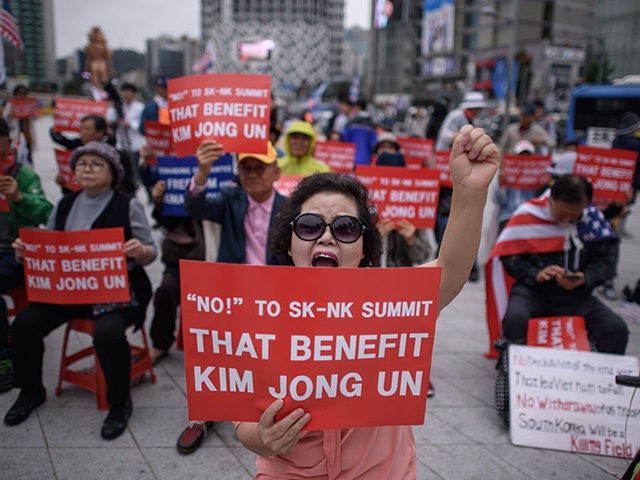WASHINGTON, DC – Human rights advocates urged American President Donald Trump on Monday to advance human rights in ongoing denuclearization negotiations with North Korea, arguing that doing so promotes U.S. national security.
Specifically, the advocates noted that the regime uses human rights violations to force citizens to work in labor camps. Their labor reportedly funds nuclear activities that threaten the United States.
During a discussion sponsored by the Heritage Foundation on Monday, Dan Aum, the director of the Washington, DC, office of the National Bureau for Asian Research think-tank, declared that “advancing human rights can contribute to our own national security.”
The money that North Korea generates from its forced labor camps “is an important source” of funds that “likely could contribute to the nuclear weapons program,” he said.
Citing the United Nations and an analysis by the South Korean government, Aum explained that labors camps raise nearly enough money – between $1.2 and $2.3 billion – to cover the estimated cost of North Korea’s nuclear program ($1.1 billion to $3.2 billion) adding:
One of the positions the Trump administration could take is that if you scale down or eliminate these labor camps and take meaningful steps on denuclearization, we would open up trade and aid and sanctions to make up for that deficit. That could be one way of linking human rights and security negotiations.
Echoing Aum, the event’s host, Olivia Enos from Heritage, indicated that human rights violations at labor camps allow North Korean dictator Kim Jung-un to continue developing nuclear weapons by providing the regime with funds.
She explained:
North Korea profits uniquely from the prison camps … this forced labor in prison camps is free labor for the regime and beyond that forced labor in the prison camps may be used expressly for the purpose of developing its various chemical, biological, and nuclear and missile programs. There have been several reports over the years that have pointed to that. And while reports are limited stories have long emerged that the regime may be testing its chemical and biological weapons on prisoners among other populations including disabled children. This is egregious in and of itself, but it’s actually helping the regime to continue its weapon development.
Acknowledging that “Kim Jong-un may be persuaded that it is actually in his interest to eliminate the prison camps in order to gain legitimacy in the international space,” Enos stressed that it is important for the Trump administration to “clearly communicate that no leader who imprisons his own people in brutal concentration-like camps can be viewed as stable or legitimate.”
Human rights and denuclearization are not mutually exclusive, Dr. Jung Pak, a Korean peninsula expert at the Brookings Institution who participated in the discussion, said, adding, “Human rights violations pay for the weapons program.”
The advocates blasted the Trump administration for not integrating human rights into the denuclearization talks.
Enos proclaimed:
The administration’s decision to leave human rights largely off the table in Singapore was arguably a victory for Kim Jong-un because it meant that North Korea was able to set the terms for negotiations something that North Koreans shouldn’t be doing whether it is on the nuclear front or the human rights front.
Some of the discussion participants noted that President Trump has softened his tone on North Korea’s human rights violations amid the ongoing discussions.
Greg Scarlatoiu, the executive director of the Committee for Human Rights in North Korea who also participated in the discussion, noted that there could be no peace in the Korean peninsula without addressing Kim’s human rights violations.
A member of the audience who identified himself as an intelligence analyst and former diplomat claimed that “when you add up the number of people who have died in the prison camps under the Kim regime, you get about a million people … that’s five or six atomic bombs worth of human bodies.”

COMMENTS
Please let us know if you're having issues with commenting.